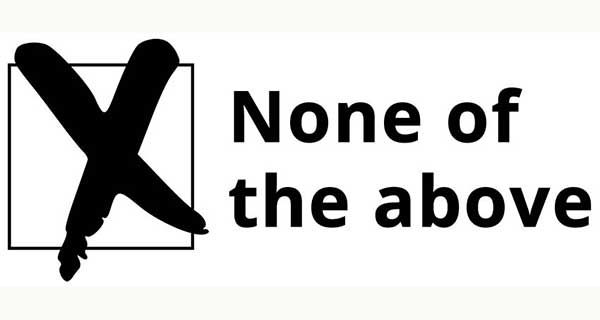 Imagine holding an election in which no one wins.
Imagine holding an election in which no one wins.
When none of the candidates meet our expectations, it’s an appealing idea. How often have each of us looked at the choices on the ballot, sighed and asked ourselves, “Is this the best we can do?”
Having nothing but poor choices can lead to a sense that whomever tops the polls doesn’t really have a full mandate. And that can put their right to govern into question.
The problem we’re describing should not be confused with the notion that everyone has to agree on the voters’ choice. Democracy is, after all, a tyranny of the majority; the losing side is always expected to put up with a decision they don’t agree with. Conservatives, for example, who were pleased with Stephen Harper’s early years in office are pretty unhappy with the Justin Trudeau era, just as Liberals feel quite the opposite.
Instead, we’re talking about cases in which every candidate has failed to capture the zeitgeist and none of the choices will fully satisfy the majority of voters. In those cases, why can’t we simply vote for ‘none of the above’?
The idea of rejecting all of the choices has been around for some time and one I’ve supported in the past. In fact, it’s already been practised through the spoiling of ballots as a way of expressing voter dissatisfaction. A spoiled ballot, however, sends an ambiguous message – because it doesn’t provide a means to clearly express why you’re doing so.
There have been attempts to legally add the ‘none of the above’ option to federal ballots. A private member’s bill in 2001 by then-Liberal MP Charles Caccia failed to win support. Former Conservative MP Peter MacKay condemned the idea by suggesting it would feed cynicism in the electoral system.
But it’s an idea that won’t go away. Recently, University of Ottawa student David Rodriguez, 26, filed a statement of claim in Federal Court arguing that limiting voting options to specific candidates “prevents electors from officially expressing dissatisfaction with all of the candidates available to them in the federal general elections.”
The Department of Justice is opposing Rodriguez’s application.
Although his chances of success seem remote, I for one hope Rodriguez is successful. Voters should be given the opportunity to say none of the options are acceptable. But that wish also comes with reservations.
An election in which ‘none of the above’ wins the majority vote would trigger an urgent dilemma. What would happen next? Would the current MPs, MLAs, councillors or trustees simply remain in office for the time being? Would a new election be called? And if so, how quickly could it be organized? And what about the significant costs of holding a new election?
Even if solutions to those practical considerations could be found, there’s an even more important challenge to consider: Can new and better candidates be secured for a new vote, and will citizens be asked once again to make a Hobson’s choice from a stable of also-rans they’ve already rejected?
It seems like a recipe for chaos.
And yet, it’s also still an idea worth exploring more fully. Public cynicism around many of our institutions, including government, is rooted in a sense that the individual can seldom drive meaningful change – as in, my vote won’t make a difference. Making the right choice depends on having an option that works for you.
Here in Alberta, voters may face just such a dilemma in the next provincial election, which must take place by the end of May 2019. On the one hand, the incumbent NDP government has delivered smart diversification strategies and progressive social and environmental policies in line with the majority will, but has also allowed provincial debt to grow massively.
The alternative, the United Conservative Party, promises much greater fiscal responsibility, but also presents a social platform and environmental ideas (such as eliminating the carbon tax) that are out of step with contemporary Albertans. For voters, neither option will truly do the trick.
There has to be a better way. Let’s have a deeper conversation on ‘none of the above.’ Ultimately, it could lay the foundation for a stronger democracy.
Veteran political commentator Doug Firby is president of Troy Media Digital Solutions and publisher of Troy Media.
The views, opinions and positions expressed by columnists and contributors are the author’s alone. They do not inherently or expressly reflect the views, opinions and/or positions of our publication.

